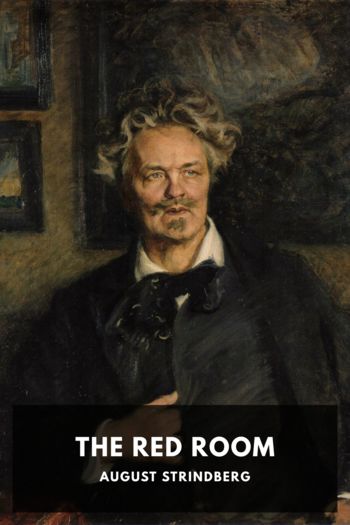The Red Room by August Strindberg (ready player one ebook TXT) 📕

- Author: August Strindberg
Book online «The Red Room by August Strindberg (ready player one ebook TXT) 📕». Author August Strindberg
Nicholas Falk paced up and down. He was wearing a black frock-coat, and had a respectable as well as a festive air. He had a right to look forward to a pleasant evening: he had arranged it; he had paid for it; he was in his own house and at his ease, for there were no ladies present, and his invited guests were of a calibre which justified him in expecting from them not only attention and civility, but a little more.
They were only two, but he did not like many people; they were his friends, reliable, devoted as dogs; submissive, agreeable, always flattering and never contradicting him.
Being a man of means, he could have moved in better circles; he might have associated with his father’s friends, and he did so, twice a year; but he was of too despotic a nature to get on with them.
It was three minutes past seven and still the guests had not arrived. Falk began to show signs of impatience. When he invited his henchmen, he expected them to be punctual to the minute. The thought of the unusually sumptuous arrangement, however, and the paralysing impression it was bound to make, helped him to control his temper a little longer; at the lapse of a few more moments Fritz Levin, the post-office official put in an appearance.
“Good evening, brother—oh! I say!” He paused in the action of divesting himself of his overcoat, and feigned surprise at the magnificent preparations; he almost seemed in danger of falling on his back with sheer amazement. “The seven-armed candlestick, and the tabernacle! Good Lord!” he ejaculated, catching sight of the hampers.
The individual who delivered these well-rehearsed witticisms while taking off his overcoat, was a middle-aged man of the type of the government official of twenty years ago; his whiskers joined his moustache, his hair was parted at the side and arranged in a coup de vent. He was extremely pale and as thin as a shroud. In spite of being well dressed, he was shivering with cold and seemed to have secret traffic with poverty.
Falk’s manner in welcoming him was both rude and patronizing; it was partly intended to express his scorn of flattery, more particularly from an individual like the newcomer, and partly to intimate that the newcomer enjoyed the privilege of his friendship.
By way of congratulation he began to draw a parallel between Levin’s promotion and his own father’s receiving a commission in the militia.
“Well, it’s a grand thing to have the royal mandate in one’s pocket, isn’t it? My father, too, received a royal mandate. …”
“Pardon me, dear brother, but I’ve only been appointed.”
“Appointed or royal mandate, it comes to the same thing. Don’t teach me! My father, too, had a royal mandate. …”
“I assure you. …”
“Assure me—what d’you mean by that? D’you mean to imply that I’m standing here telling lies? Tell me, do you mean to say that I’m lying?”
“Of course I don’t! There’s no need to lose your temper like that!”
“Very well! You’re admitting that I’m not telling lies, consequently you have a royal mandate. Why do you talk such nonsense? My father. …”
The pale man, in whose wake a drove of furies seemed to have entered the countinghouse—for he trembled in every limb—now rushed at his patron, firmly resolved to get over with his business before the feast began, so that nothing should afterwards disturb the general enjoyment.
“Help me,” he groaned, with the despair of a drowning man, taking a bill out of his pocket.
Falk sat down on the sofa, shouted for Andersson, ordered him to open the bottles and began to mix the bowl.
“Help you? Haven’t I helped you before?” he replied. “Haven’t you borrowed from me again and again without paying me back? Answer me! What have you got to say?”
“I know, brother, that you have always been kindness itself to me.”
“And now you’ve been promoted, haven’t you? Everything was to be all right now; all debts were to be paid and a new life was to begin. I’ve listened to this kind of talk for eighteen years. What salary do you draw now?”
“Twelve hundred crowns instead of eight hundred as before. But now, think of this: the cost of the mandate was one hundred and twenty-five; the pension fund deducts fifty; that makes one hundred and seventy-five. Where I am to take it from? But the worst of it all is this: my creditors have seized half my salary; consequently I have now only six hundred crowns to live on instead of eight hundred—and I’ve waited nineteen years for that. Promotion is a splendid thing!”
“Why did you get into debt? One ought never to get into debt. Never—get—into debt.”
“With a salary of eight hundred crowns all these years! How was it possible to keep out of it?”
“In that case you had no business to be in the employ of the government. But this is a matter which doesn’t concern me; doesn’t—concern—me.”
“Won’t you sign once more? For the last time?”
“You know my principles; I never sign bills. Please let the matter drop.”
Levin, who was evidently used to these refusals, calmed down. At the same moment schoolmaster Nyström entered, and, to the relief of both parties, interrupted the conversation. He was a dried-up individual of mysterious appearance and age. His occupation, too, was mysterious; he was supposed to be a master at a school in one of the southern suburbs—nobody ever asked which school and he did not care to talk about it. His mission, so far as Falk





Comments (0)